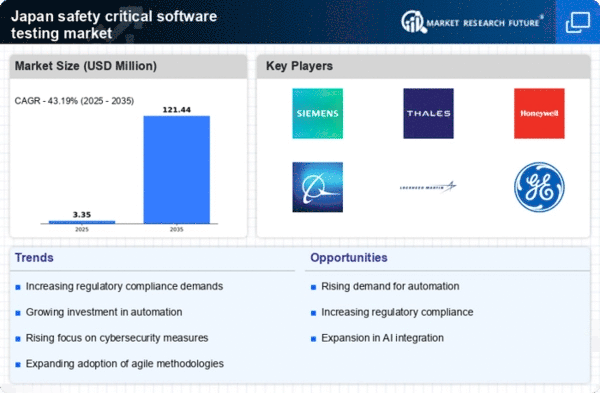Rising Investment in R&D
Investment in research and development (R&D) within the safety critical-software-testing market is on the rise in Japan, driven by the need for innovative testing solutions. Companies are allocating significant resources to develop new methodologies and tools that can address the complexities of modern software systems. In 2025, it is estimated that R&D spending in this sector will reach approximately $500 million, reflecting a commitment to enhancing software safety. This focus on R&D is crucial as it fosters the development of cutting-edge testing technologies, which are essential for meeting the evolving demands of industries such as aerospace and medical devices. Thus, the safety critical-software-testing market is poised for growth as organizations prioritize R&D initiatives.
Increased Regulatory Scrutiny
The safety critical-software-testing market in Japan is experiencing heightened regulatory scrutiny, particularly in sectors such as automotive and healthcare. Regulatory bodies are enforcing stricter compliance standards, which necessitates rigorous testing protocols to ensure software reliability and safety. For instance, the Ministry of Land, Infrastructure, Transport and Tourism has mandated comprehensive testing for automotive software, reflecting a broader trend across industries. This regulatory environment compels organizations to invest in advanced testing methodologies, thereby driving growth in the safety critical-software-testing market. As a result, companies are increasingly adopting automated testing solutions to meet compliance requirements efficiently, which is expected to enhance market dynamics significantly.
Demand for Enhanced Software Quality
The demand for enhanced software quality is a significant driver in the safety critical-software-testing market in Japan. Industries such as automotive, aerospace, and healthcare are increasingly prioritizing software quality to ensure the safety and reliability of their products. This focus on quality is reflected in the adoption of rigorous testing standards and practices, which are essential for maintaining competitive advantage. In 2025, it is projected that the market for quality assurance in safety-critical software will grow by approximately 25%. Companies are recognizing that investing in high-quality testing processes not only mitigates risks but also enhances customer trust and satisfaction. Therefore, the safety critical-software-testing market is likely to expand as organizations strive to meet the growing expectations for software quality.
Growing Awareness of Cybersecurity Risks
As cybersecurity threats continue to escalate, there is a growing awareness of the importance of robust software testing in Japan. The safety critical-software-testing market is increasingly influenced by the need to address vulnerabilities that could compromise safety-critical systems. Organizations are recognizing that inadequate testing can lead to severe consequences, including financial losses and reputational damage. In response, companies are investing in comprehensive testing frameworks that incorporate cybersecurity measures. This trend is expected to drive market growth, as businesses seek to ensure that their software is not only functional but also secure against potential cyber threats. The emphasis on cybersecurity within the safety critical-software-testing market is likely to shape future testing strategies.
Technological Integration in Testing Processes
The integration of advanced technologies such as artificial intelligence (AI) and machine learning (ML) is transforming the safety critical-software-testing market in Japan. These technologies enable more efficient testing processes, allowing for the identification of potential software failures at earlier stages. The adoption of AI-driven testing tools is projected to increase by approximately 30% over the next few years, as organizations seek to enhance their testing capabilities. This technological evolution not only improves the accuracy of testing but also reduces time-to-market for critical software applications. Consequently, the safety critical-software-testing market is likely to witness substantial growth as companies leverage these innovations to ensure software safety and reliability.
















